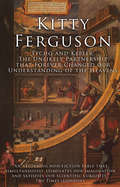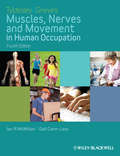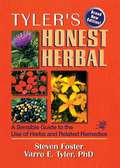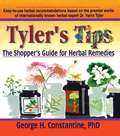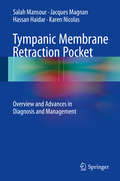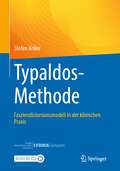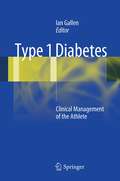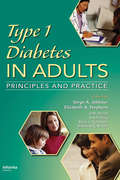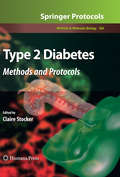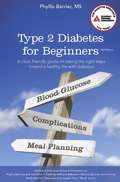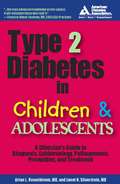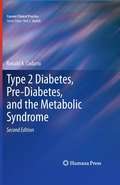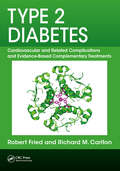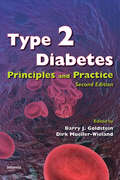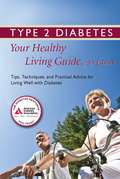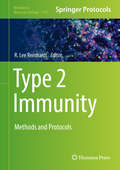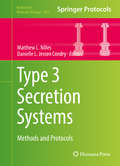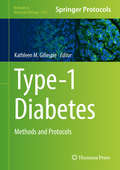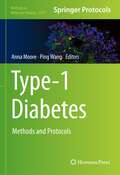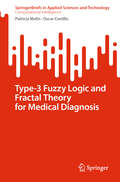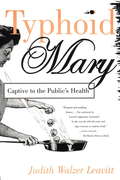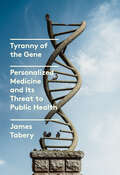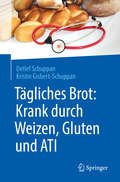- Table View
- List View
Tycho and Kepler: The Unlikely Partnership that Forever Changed our Understanding of the Heavens
by Kitty FergusonThe extraordinary, unlikely tale of Tycho Brahe and Johannes Kepler and their enormous contribution to astronomy and understanding of the cosmos is one of the strangest stories in the history of science.Kepler was a poor, devoutly religious teacher with a genius for mathematics. Brahe was an arrogant, extravagant aristocrat who possessed the finest astronomical instruments and observations of the time, before the telescope. Both espoused theories that seem off-the-wall to modern minds, but their fateful meeting in Prague in 1600 was to change the future of science.Set in one of the most turbulent and colourful eras in European history, when medieval was giving way to modern, Tycho and Kepler is a double biography of these two remarkable men.
Tyldesley and Grieve's Muscles, Nerves and Movement in Human Occupation
by Gail Carin-Levy Ian McMillanNow in its fourth edition 'Tyldesley and Grieve's Muscles, Nerves and Movement' has established itself as the leading textbook for the study of movement by occupational therapists. The book provides students with a sound understanding of the way in which bones, joints, muscles and nerves allow the body to perform movement during daily activities. Early chapters provide a foundation for the study of movement, with the complexity of detail increasing as the book progresses. Functional anatomy is related to the movements of daily living and is supported by activities for experiencing and observing the way we perform everyday tasks. Later chapters consider the integration of sensory and motor processes for the planning and execution of movement. This fourth edition has been extensively updated and revised. Highly illustrated and now in full colour throughout the book also includes: • Case histories with self assessment exercises • Summary boxes • Key terms • Practice notepads
Tyler's Honest Herbal: A Sensible Guide to the Use of Herbs and Related Remedies
by Steven FosterHere is the fourth edition of Tyler's Honest Herbal: A Sensible Guide to the Use of Herbs and Related Remedies, providing essential botanical information as well as folkloric background of herbal remedies in a clear, accessible style. Unlike other herb books, this book gives you a serious evaluation of both the positive and negative features of the
Tyler's Tips: The Shopper's Guide for Herbal Remedies
by Virginia M Tyler George H. ConstantineA comprehensive and easy-to-use reference to the most popular and effective herbal products on the market! Tyler's Tips: The Shopper's Guide for Herbal Remedies offers consumers valuable information about the uses, benefits, origins, precautions, dosage forms, and price ranges of herbal products in a clear and concise manner. Arranged by therapeutic uses in order to give you a variety of options for various ailments, this accessible guide only lists herbs that have shown effectiveness in scientific trials. Tyler's Tips contains information that will help you decide what herbal products are reliable, safe, and appropriate for your needs.Designed to be taken with you when buying herbs, this book lists one herb on each page, making it easier for you to look up a particular entry. Offering herbs that will aid several ailments, such as headaches, liver dysfunction, ulcers, menopause, skin problems, and bladder problems, Tyler's Tips provides you with information on over 35 herbs, including: St. John's wort kava gingko ginseng soy black cohosh aloe rhubarb goldenrod licorice tea tree eleuthero red cloverComprehensive and current, this book also informs you about well-known herbs that are widely used, but have not yet been proven to be successful. Full of practical facts, Tyler's Tips will assist you in choosing herbs that can improve your health and fit your budget.
Tympanic Membrane Retraction Pocket
by Salah Mansour Jacques Magnan Hassan Haidar Karen NicolasThis book reviews current knowledge of the etiopathogenesis, pathophysiology, and molecular biology of tympanic membrane retraction pockets and provides clear guidance on clinical assessment and treatment. A new diagnostic approach based on clinicoradiologic correlations is presented, and the ability of computer tomography to offer objective criteria for improved differentiation between stable and unstable or unsafe retraction pockets is explained. Surgical options are discussed, and on the basis of their own clinical and surgical experiences the authors propose a novel procedure, masto-atticotomy with anterior epitympanotomy (AER surgery), which addresses the causative factors underlying a retraction pocket. This surgery aims to restore adequate aeration routes for the middle ear compartments situated above the tympanic diaphragm; it results in better control of the pathology and in most cases prevents its recurrence. The book will assist otologists and surgeons in ensuring that retraction pockets are effectively diagnosed and treated, avoiding progression to cholesteatoma.
Typaldos-Methode: Fasziendistorsionsmodell in der klinischen Praxis
by Stefan AnkerOb Osteopathie oder Physiotherapie: Dieses Praxisbuch vermittelt detaillierte Grundlagen zur Diagnose von Fasziendistorsionen und zur Behandlung mit der Typaldos-Methode. Wie entstehen Triggerbänder? Welche Indikationen oder Kontraindikationen gibt es für die Hernien-Triggerpunkt-Technik? Wie können Sie Erfolge und Misserfolge in der Therapie analysieren und welche Konsequenzen ziehen Sie daraus? Der Autor als Experte liefert Ihnen die Antworten!Aus dem Inhalt:Alle sechs Fasziendistorsionen nach TypaldosEntstehungsmechanismen, Symptome und KörperspracheDetaillierte Behandlung der sechs FasziendistorsionenWirkungen, Nebenwirkungen und ergänzende Maßnahmen zur Stabilisierung des BehandlungserfolgsOrientiert am Curriculum der European Fascial Distorsion Model Association.Plus: Übersichten und Vergleichstabellen zum DownloadAkute Beschwerden, nicht erklärbare Symptome oder chronische Schmerzen: Die Typaldos-Methode und das Fasziendistorsionsmodell erweitern Ihren fachlichen Horizont und verhelfen Ihren Patient*innen zur bestmöglichen Beschwerdefreiheit in Alltag und Sport.
Type 1 Diabetes
by Ian GallenThere has been a recent surge of new data on the subject of exercise and sport in type I diabetes, as well as great interest from the multidisciplinary healthcare teams looking after such patients. Providing advice and support to enable athletes to manage their diabetes during and after sport is an essential part of diabetes care. Type I Diabetes: Clinical Management of the Athlete outlines best practice and scientific progress in the management of people with type I diabetes who undertake a sport at any level. The book explores endocrine response to exercise, hypoglycemia and dietetics in the diabetic patient, and provides real-life examples of type I diabetes management at the professional athlete level. It is the first source of reference for specialists in diabetes when seeking advice on how to manage their patient and provides practical advice for equipping the type I diabetes patient with the ability to fulfill their sporting potential.
Type 1 Diabetes in Adults: Principles and Practice
by Serge Jabbour Elizabeth A. StephensRecent research in diabetes has proven Type 1 diabetes is no longer only a juvenile disease. It has been projected adult Type 1 diabetes will increase 40% from 1997-2010, and as our understanding of the pathogenesis of Type 1 and Type 2 diabetes grows - it is apparent that some cases previously classified as Type 2 are actually adult onset Type 1 d
Type 2 Diabetes
by Claire StockerDiabetes is now reaching epidemic proportions, and the associated complications of this disease can be disabling and even life-threatening. In Type 2 Diabetes: Methods and Protocols, leading investigators provide up-to-date explanations of commonly used laboratory protocols used in diabetes research. Covering the commonly described in vivo and in vitro model systems, the volume ultimately leads to an overall view of how cellular dysfunction and degeneration leads to susceptibility and diabetes disease progression. Written in the highly successful Methods in Molecular BiologyTM series format, chapters include brief introductions to their respective subjects, lists of the necessary materials and reagents, step-by-step, readily reproducible protocols, and expert notes on troubleshooting and avoiding known pitfalls. Comprehensive and cutting-edge, Type 2 Diabetes: Methods and Protocols offers succinct, proven techniques to aid research scientists and clinicians in continuing the study of this debilitating disease.
Type 2 Diabetes for Beginners
by Phyllis BarrierWith this book readers learn how to take care of themselves or someone they love when diagnosed with type 2 diabetes. Completely updated, this second edition of Type 2 Diabetes for Beginners provides insight and information on how to live with diabetes. Checking blood sugar, taking medications, planning meals, losing weight, combating stress and depression, and dealing with long-term diabetes problems are just a few of the topics covered in this friendly, easy-to-read guide.
Type 2 Diabetes in Children and Adolescents
by Arlan L. Rosenbloom Janet H. SilversteinEpidemiology of type 2 diabetes in youth, including evidence for and magnitude of the epidemic; pathophysiology in youth, case-finding criteria, and when to consider the possibility of type 2; and how to diagnose and treat diabetes in children and adolescents.
Type 2 Diabetes, Pre-Diabetes, and the Metabolic Syndrome
by Ronald A. CodarioDiagnosing and managing type 2 diabetes presents an enormous challenge to the primary care provider confronted with multiple emerging scientific insights, therapeutic strategies and risk reduction principles. In Type 2 Diabetes, Pre-Diabetes, and the Metabolic Syndrome: The Primary Care Guide to Diagnosis and Management, Second Edition, Ronald A. Codario, M.D., FACP -- a well-known and highly respected authority on diabetes -- details the state-of-the-art in diagnosing, managing and attenuating risks in patients with this disease. Utilizing his extensive experience in private practice, medical education and clinical research for over 35 years, Dr. Codario explains in simple clinical terms, the current understanding of the pathophysiology of diabetes, the latest clinical trials, developing controversies, updates on new medications and an expanded section on Special Populations. With his unique, multiple board certifications in clinical hypertension, vascular medicine, internal medicine, vascular ultrasound and clinical lipidology, Dr. Codario provides practical guidelines for treatment with insulin and oral agents, lipid and hypertension control and comprehensive risk reduction strategies. Extensively reviewed are the metabolic syndrome, the role of exercise and nutrition, and key issues associated with herb and nutriceutical use. Illustrative case studies in diabetes management, an outstanding bibliography of suggested readings, and extensive chapter subheadings for quick reference make this book a practical, easy-to-read guide for dealing with this killer disease. Type 2 Diabetes, Pre-Diabetes, and the Metabolic Syndrome: The Primary Care Guide to Diagnosis and Management, Second Edition is the direct result of many years of listening, teaching, lecturing and empathizing with fellow primary care providers and their patients in the ongoing fight against diabetes. Like the internationally acclaimed first edition, this is a must read and invaluable guide for all primary care providers, students, caregivers and patients battling the ravages of this ever increasing epidemic.
Type 2 Diabetes: Cardiovascular And Related Complications And Evidence-based Complementary Treatments
by Robert Fried Richard M. CarltonBoca Raton : CRC Press, 2017. | Includes index
Type 2 Diabetes: Principles and Practice, Second Edition
by Barry J. Goldstein Dirk Müller–WielandThe incidence and prevalence of type 2 diabetes mellitus have increased dramatically in modernized and developing nations over the past few decades. Thoroughly revised and expanded, this Second Edition responds to the epidemic and supplies a current overview and guide to the management of diabetes in the modern healthcare environment. This Second E
Type 2 Diabetes: Your Healthy Living Guide
by American Diabetes AssociationOver 20,000 units sold of the third edition aloneCompletely reworked from the ground up, this new edition of Type 2 Diabetes: Your Healthy Living Guide is better than ever. Rewritten with the help of a team of diabetes experts, this ADA bestseller is now friendlier, easier-to-read, better designed, and more comprehensive. This is one book every person with type 2 diabetes needs on their bookshelf.
Type 2 Immunity: Methods and Protocols (Methods in Molecular Biology #1799)
by R. Lee ReinhardtThis book provides researchers the opportunity to investigate type-2-associated diseases in their laboratories. Beginning with chapters describing various models of type-2 immunity, the volume then continues by detailing cellular protocols designed to identify, characterize, and assess the function of key adaptive and innate immune cells involved in type-2 inflammation; approaches to isolate and evaluate specific cellular subsets at the genetic, epigenetic, and molecular level; protocols to assess type-2 immunity and its relationship to organismal and metabolic systems (ex. Microbiome). This book concludes with a section that explores the use of primary human cells in evaluating relevance to the clinic. Written in the highly successful Methods in Molecular Biology series format, chapters include introductions to their respective topics, lists of the necessary materials and reagents, step-by-step, readily reproducible laboratory protocols, and tips on troubleshooting and avoiding known pitfalls.Vital and authoritative, Type 2 Immunity: Methods and Protocols aims to provide a broad network of methods that can be used to develop a hypothesis and investigate its potential from bench to beside.
Type 2 Immunity: Methods and Protocols (Methods in Molecular Biology #1799)
by R. Lee ReinhardtThis book provides researchers the opportunity to investigate type-2-associated diseases in their laboratories. Beginning with chapters describing various models of type-2 immunity, the volume then continues by detailing cellular protocols designed to identify, characterize, and assess the function of key adaptive and innate immune cells involved in type-2 inflammation; approaches to isolate and evaluate specific cellular subsets at the genetic, epigenetic, and molecular level; protocols to assess type-2 immunity and its relationship to organismal and metabolic systems (ex. Microbiome). This book concludes with a section that explores the use of primary human cells in evaluating relevance to the clinic. Written in the highly successful Methods in Molecular Biology series format, chapters include introductions to their respective topics, lists of the necessary materials and reagents, step-by-step, readily reproducible laboratory protocols, and tips on troubleshooting and avoiding known pitfalls.Vital and authoritative, Type 2 Immunity: Methods and Protocols aims to provide a broad network of methods that can be used to develop a hypothesis and investigate its potential from bench to beside.
Type 3 Secretion Systems
by Matthew L. Nilles Danielle L. Jessen CondryThis volume discusses various basic and advanced methods and protocols that have been proven to be successful among certain bacterial species, or a family of species, in type III secretion systems (T3S system). The chapters in this book cover topics such as: site-directed mutagenesis and its application in studying the interactions of T3S components; use of transcriptional control to increase expression and secretion of heterologous proteins in T3S systems; fractionation techniques to examine effector translocation; detecting immune responses to T3S systems; mouse immunization with purified needle proteins from T3S systems and the characterization of the immune responses to these proteins; and detection of protein interactions in T3S systems using yeast 2-hybrid analysis. Written in the highly successful Methods in Molecular Biology series format, chapters include introductions to their respective topics, lists of the necessary materials and reagents, step-by-step, readily reproducible laboratory protocols, and tips on troubleshooting and avoiding known pitfalls. Practical and comprehensive, Type 3 Secretion Systems: Methods and Protocols is a valuable resource for anyone interested in learning about the fascinating and ever-changing T3S systems.
Type IV Secretion in Gram-Negative and Gram-Positive Bacteria (Current Topics in Microbiology and Immunology #413)
by Steffen Backert Elisabeth GrohmannType IV secretion systems (T4SSs) are highly versatile membrane-associated transporter machines used by Gram-negative and Gram-positive bacteria to deliver substrate molecules to a large variety of target cells. This volume summarizes our current knowledge of the large variety and structural diversity of T4SSs in pathogenic Escherichia, Agrobacterium, Legionella, Coxiella, Bartonella, Helicobacter, Enterococcus and other species. Divided into 13 chapters contributed by leading experts, it presents findings that significantly enhance our understanding of how various pathogens manipulate host cell functions to trigger bacterial uptake, promote intracellular growth, suppress defense mechanisms and of how bacteria spread antibiotic resistances, thus facilitating bacterial colonization and disease development. The book is an invaluable source of information for researchers and clinicians.
Type-1 Diabetes
by Kathleen M. GillespieThe aim of this volume is to presentcurrent methodologies to predict and understand the pathogenesis of Type-1Diabetes for clinical and non-clinical researchers. Writtenin the highly successful Methods in Molecular Biology series format,chapters include introductions to their respective topics, lists of thenecessary materials and reagents, step-by-step, readily reproducible laboratoryprotocols, and key tips on troubleshooting and avoiding known pitfalls. Practicaland reliable, Type-1 Diabetes: Methods and Protocols will aidresearchers in using these methods to advance their own studies.
Type-1 Diabetes: Methods and Protocols (Methods in Molecular Biology #2592)
by Ping Wang Anna MooreThis volumes details methods focusing on technological innovation and recent advances in diabetes management. Chapters will guide readers through recent advances, beta-cell regeneration, non-invasive imaging of endogenous, transplanted islets theranostics, microRNA profiling of beta-cells and artificial intelligence, and deep learning algorithms in diabetes. Written in the successful Methods in Molecular Biology series format, chapters include introductions to their respective topics, lists of the necessary materials and reagents, step-by-step, readily reproducible protocols, and notes on troubleshooting and avoiding known pitfalls. Authoritative and cutting-edge, Type-1 Diabetes: Methods and Protocols is for a broad audience including basic researches, clinicians, and physician scientists whose major focus is in diabetes.
Type-3 Fuzzy Logic and Fractal Theory for Medical Diagnosis (SpringerBriefs in Applied Sciences and Technology)
by Oscar Castillo Patricia MelinThis book is intended to be a reference for scientists and engineers interested in applying type-3 fuzzy logic and fractal theory techniques in medical diagnosis. In this book, a new model based on type-3 fuzzy logic and fractal theory for applications in medical diagnosis is presented. The main idea is that a higher type and order of fuzzy logic can help in solving various diagnosis problems and find better results. In addition, fractal theory is also employed for enhancing medical diagnosis. In this regard, several hybrid intelligent methods are offered. In this book, the authors test the proposed methods using several medical diagnosis problems, like diagnosis of problems in the brain, hearth, lungs, and others. The authors can notice that when type-3 fuzzy systems are implemented to model the behavior of systems, the results in diagnosis are enhanced, because the management of uncertainty is better. For this reason, the authors consider in this book the proposed methods using type-3 fuzzy systems and fractal theory to improve the diagnosis in complex medical problems.
Typhoid Mary
by Judith Walzer LeavittShe was an Irish immigrant cook. Between 1900 and 1907, she infected twenty-two New Yorkers with typhoid fever through her puddings and cakes; one of them died. Tracked down through epidemiological detective work, she was finally apprehended as she hid behind a barricade of trashcans. To protect the public's health, authorities isolated her on Manhattan's North Brother Island, where she died some thirty years later.This book tells the remarkable story of Mary Mallon--the real Typhoid Mary. Combining social history with biography, historian Judith Leavitt re-creates early-twentieth-century New York City, a world of strict class divisions and prejudice against immigrants and women. Leavitt engages the reader with the excitement of the early days of microbiology and brings to life the conflicting perspectives of journalists, public health officials, the law, and Mary Mallon herself.Leavitt's readable account illuminates dilemmas that continue to haunt us. To what degree are we willing to sacrifice individual liberty to protect the public's health? How far should we go in the age of AIDS, drug-resistant tuberculosis, and other diseases? For anyone who is concerned about the threats and quandaries posed by new epidemics, Typhoid Mary is a vivid reminder of the human side of disease and disease control.
Tyranny of the Gene: Personalized Medicine and Its Threat to Public Health
by James TaberyA revelatory account of how power, politics, and greed have placed the unfulfilled promise of personalized medicine at the center of American medicineThe United States is embarking on a medical revolution. Supporters of personalized, or precision, medicine—the tailoring of health care to our genomes—have promised to usher in a new era of miracle cures. Advocates of this gene-guided health-care practice foresee a future where skyrocketing costs can be curbed by customization and unjust disparities are vanquished by biomedical breakthroughs. Progress, however, has come slowly, and with a price too high for the average citizen.In Tyranny of the Gene, James Tabery exposes the origin story of personalized medicine—essentially a marketing idea dreamed up by pharmaceutical executives—and traces its path from the Human Genome Project to the present, revealing how politicians, influential federal scientists, biotech companies, and drug giants all rallied behind the genetic hype. The result is a medical revolution that privileges the few at the expense of health care that benefits us all.Now American health care, driven by the commercialization of biomedical research, is shifting focus away from the study of the social and environmental determinants of health, such as access to fresh and nutritious food, exposure to toxic chemicals, and stress caused by financial insecurity. Instead, it is increasingly investing in &“miracle pills&” for leukemia that would bankrupt most users, genetic studies of minoritized populations that ignore structural racism and walk dangerously close to eugenic conclusions, and oncology centers that advertise the perfect gene-drug match, igniting a patient&’s hope, and often dashing it later.Tyranny of the Gene sounds a warning cry about the current trajectory of health care and charts a path to a more equitable alternative.
Tägliches Brot: Krank durch Weizen, Gluten und ATI
by Detlef Schuppan Kristin Gisbert-SchuppanUnser tägliches Brot ist in Verruf geraten. Getreide soll uns fett, dumm und krank machen. Angesichts der Schwemme an Publikationen und Ratschlägen herrschen inzwischen bei Verbrauchern und Patienten ebenso wie bei Ärzten und anderen in Gesundheitsberufen Tätigen allgemeine Orientierungs- und Ratlosigkeit. Der weltweit führende Wissenschaftler und Arzt auf dem Gebiet der Getreideunverträglichkeiten und seine Koautorin schaffen hier Klarheit und geben einen Überblick über die getreidebedingten Erkrankungen: Zöliakie, typische und untypische Getreideallergien sowie ATI-Sensitivität. Sowohl die untypischen Getreideallergien als auch die ATI-Sensitivität werden hier erstmals einer breiten Öffentlichkeit vorgestellt. Allein von diesen Krankheitsbildern sind 3 bis 10% der Bevölkerung betroffen. Typische Fallbeispiele von Patienten aus der Spezialambulanz des Autors und Hinweise für Verbraucher und Patienten runden das Buch ab. Es richtet sich sowohl an medizinische Experten als auch an Betroffene und interessierte Laien.
